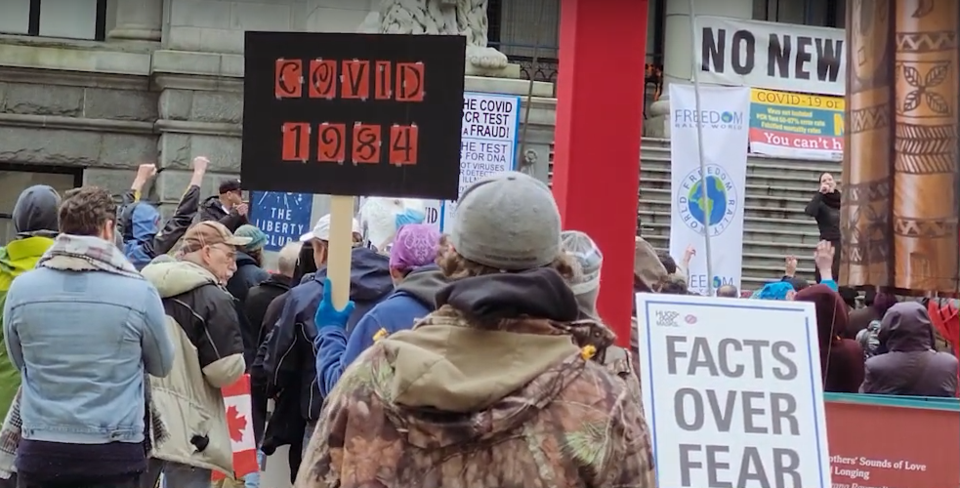A BC Supreme Court judge has ruled the COVID-19 public health order prohibiting outdoor protests was unconstitutional.
In a decision Thursday night, released by the Justice Centre for Constitutional Freedoms, Chief Justice Christopher Hinkson ruled that while the ban on in-person, indoor church services was an infringement on British Columbians' Charter rights, it was "reasonable and proportionate" under Section 1 of the Charter. But he did not find the same could be said about the ban on outdoor protests.
The decision may not have many real-world consequences moving forward though, as Provincial Health Officer Dr. Bonnie Henry amended her order on Feb. 10, allowing for “outdoor assemblies for the purpose of communicating a position on a matter of public interest or controversy, subject to my expectation that persons organizing or attending such an assembly will take the steps and put in place the measures recommended in the guidelines posted on my website in order to limit the risk of transmission of COVID-19."
As such, the provincial government conceded to Chief Justice Hinkson that the ban on outdoor protests prior to Feb. 10 “were of no force and effect during that time.”
No fines issued despite warning
Dr. Henry's amendment to her public health order on Feb. 10 was not widely publicized though. In fact, on that same day, Kelowna RCMP Superintendent Kara Triance issued a public statement, warning that a Feb. 13 protest in Stuart Park would be "unlawful." Despite the warning, no fines were issued.
For many months, a group of varying size has gathered in Kelowna's Stuart Park every Saturday to protest B.C.'s measures that have been put in place to reduce the transmission of COVID-19. Organizer David Lindsay, has been handed several $2,300 fines prior to Feb. 10 and he's spoken to the organized crowd in the past about why he thinks Dr. Henry should be arrested for her handling of the pandemic.
Alain Beaudoin of Dawson Creek had organized three protests against what he called "draconian” restrictions in December of 2020, and he was ticketed during the last one. Beaudoin was one of the petitioners represented by the Justice Centre for Constitutional Freedoms in its recent legal challenge of B.C.'s COVID-19 measures.
With no opposition from the provincial government, Chief Justice Hinkson agreed the ban on protests infringed on Beaudoin's' 2(c) and 2(d) Charter rights, which guarantees the right of peaceful assembly and of association.
'No force and effect'
But despite ruling the order had “no force and effect,” Chief Justice Hinkson “reluctantly” stopped short of ruling Beaudoin's $2,300 ticket invalid, after the province argued they nor the judge had been provided with any specific information about why the ticket was issued.
“The validity of the ticket does not necessarily depend upon the constitutionality of the impugned orders,” Chief Justice Hinkson said. “I should not adjudicate on their validity without the factual background that resulted in their issuance.”
It's unclear if Beaudoin will seek a separate judicial review of his ticket, or how the ruling will impact others who've received similar tickets.
Castanet has reached out to the Ministry of Public Safety and Solicitor General to see if the government will continue to pursue payment of these fines, but a spokesperson said they would likely not have a response until next week.

.jpeg;w=120;h=80;mode=crop)

